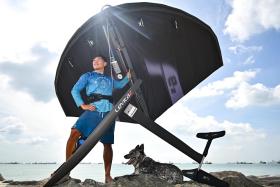Indonesia's football team set to compete at SEA Games
Wheels in motion for government to lift PSSI ban and avoid Fifa sanctions
Indonesia were in danger of being sanctioned by Fifa, which would have prevented their teams from taking part in the South-east Asia (SEA) Games football tournament that kicks off here on Friday, as well as World Cup qualifiers later this month.
But latest developments in the archipelago suggest that the Indonesian Under-23 team will take their place in Group A of the SEA Games - alongside the Philippines, Cambodia, Myanmar and Aide Iskandar's Singapore side.
World football's governing body had set a May 29 deadline for the Indonesian government to cease its interference in the affairs of the country's Football Association (PSSI), and the wheels are already in motion for that to happen - starting with a revocation of the government ban on the PSSI.
REVOCATION
"I hope the revocation process can be completed this afternoon," Indonesian Vice-President Jusuf Kalla told a press conference in Jakarta, after meeting with Youth and Sports Minister Imam Nahrawi, the Indonesian National Sports Commission and PSSI representatives, on Monday.
He was quoted by the Jakarta Post as saying: "PSSI should be active again in order for competition to resume. Problems (with Fifa) will then be automatically resolved."
The New Paper had earlier reported that the Indonesia's possible no-show would change the face of the SEA Games football tournament.
It would have resulted in either a redrawing of the groups, which currently sees five teams in Group A, and six in Group B; or the organisers could leave Group A with just four sides.
Considered one of the giants of South-east Asian football, and perennial contenders for honours, an absent Indonesia would have been a blow to the SEA Games tournament.
While SEA Games organisers can apparently breathe a sigh of relief, the issues in Indonesian football run deeper, with several more twists ahead.
Fifa had threatened to enforce sanctions on Indonesia after its government stepped in to first order the PSSI to ban two clubs - Malang-based Arema Indonesia, and Persebaya Surabaya - over issues of "legally flawed" ownership.
The government then proceeded to suspend the PSSI for ignoring its orders, after which a new PSSI chairman was elected at an extraordinary congress.
The country's domestic league, the Indonesian Super League (ISL), was then suspended, with sources revealing that some clubs had cancelled contracts of players without compensation.
According to FIFPro - the worldwide representative organisation for professional players - this is one of the biggest problems in Indonesian football.
MANY FAILINGS
In a post on their website dated May 8, FIFPro stated that they have "noticed many failings in the nation's football governance" that have resulted in a large number of players suffering from clubs refusing to pay their salaries.
The body cited the "death of Diego Mendieta, who passed away in 2012 due to consequences of non-payment" as an example.
The Paraguayan died of a viral infection after he was unable to afford treatment after months without wages. A year later Cameroonian striker Salomon Bengondo died under similar circumstances.
He died at the age of 32, unable to afford hospital treatment for a mystery illness.
His former club Persipro allegedly still owed him large sums of money.
FIFPro's Asia division chief Brendan Schwab has called for a pragmatic solution which looks past Fifa statutes and rules.
"PSSI should be active again in order for competition to resume. Problems (with Fifa) will then be automatically resolved."
- Indonesian Vice-President Jusuf Kalla
Get The New Paper on your phone with the free TNP app. Download from the Apple App Store or Google Play Store now



